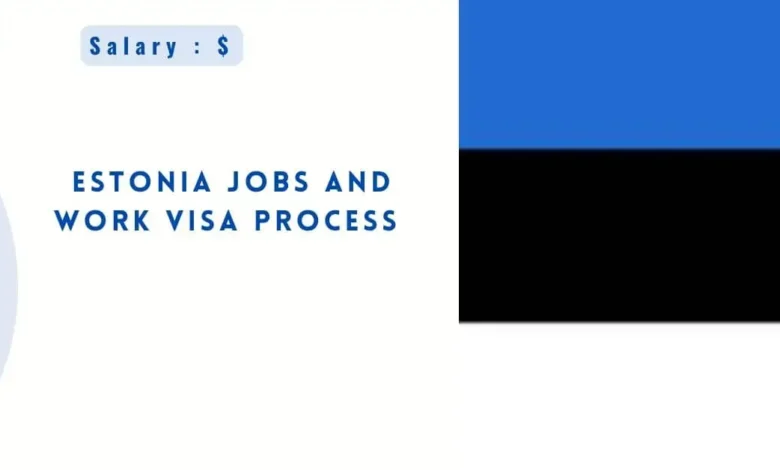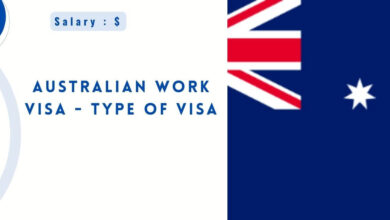Estonia Jobs and Work Visa Process 2025

The small Baltic country of Estonia is becoming known as the “Silicon Valley of Europe” because it is becoming a tech hub for Europe. It is a great place for foreign talent to work because it has a strong economy, competitive salaries, and an open-minded culture. This guide will cover everything you need to know about Estonia’s high-demand skill shortage jobs, why foreign workers might want to work there, and how to get a work visa for this great place to live and work.
Estonia’s Skill Shortage: A Gateway for International Talent
There aren’t enough skilled workers in many areas of Estonia’s economy because the workforce is getting older and the tech industry is doing very well. A study from the European Center for the Development of Vocational Training (CEDEFOP) says that software development, engineering, and healthcare are some of the most important fields that are having trouble finding enough qualified people. People with the right skills are actively sought after from all over the world to fill jobs in these areas.
Occupations in High Demand in Estonia due to Workforce & Skill Shortages:
- Software and Applications Developers and Analysts
- Electrical, Electronics, Mechanical, and Industrial Engineers
- Production and Operations Managers
- Sales, Construction, and ICT Project Managers
- Business Analysts, Web Developers, and Data Scientists
- Nurses and Teachers
Why Should International Workers Consider Working in Estonia?
Estonia has a lot of good reasons for skilled people from other countries to think about working there:
Competitive Salaries:
Estonia has paid between 4,000 and 5,000 EUR, especially in tech and related fields.
Low Income Tax:
Since Estonia has a flat 20% income tax rate, it has one of the lowest income tax rates in the EU.
Digital Governance:
Estonia has a revolutionary e-governance system that lets people vote, pay taxes, and apply for visas all online.
Thriving Tech Scene:
Take the chance to work in what is called the “Silicon Valley of Europe.” Tallinn is a center for tech innovation, and companies there help foreign IT workers move very well.
High Standard of Living:
Estonia has a very high standard of living, with top-notch facilities, healthcare, and education.
Salaries and Taxation in Estonia
Estonia has good wages, especially in the tech industry, and a tax system that is easy on businesses. A flat income tax rate of 20% means that professionals can keep a big chunk of their salary, which means they have more money to spend.
Where You Can Find Jobs in Estonia:
Skilled workers and job seekers from Estonia, Europe, and other countries can look for work on many sites, such as
- The Estonian Ministry of Economic Affairs and Communications
- The Estonian Chamber of Commerce and Industry
- Eesti Töötukassa (Estonian Unemployment Insurance Fund)
- Popular job boards like CV Keskus, Indeed, Work in Estonia, CareerBuilder, Monster, and Glassdoor.
- Estonian Association of Information Technology and Telecommunications
Check Also: Kuwait Work Visa – Types of Visa
How to Get Your Job in Estonia With Estonian Work Visa?
People who want to work in Estonia can get different kinds of visas and permits. Some of these types are:
Types of Estonia Work Visa:
- Estonian Short-Stay Visa (Type C): This lets you stay for up to 90 days in a 180-day period, which is good for work trips, conferences, or short-term training programs.
- Estonia Long-Stay Visa (Type D): This is good for stays longer than 90 days and up to a year. It can be used by people who have found work in Estonia or want to start a business there.
Exemption from Estonia Work Visa – Are You Exempted?
To work in Estonia, not everyone needs a visa. People who are from Switzerland, the European Economic Area (EEA), or the European Union (EU) do not need a work visa to live or work in Estonia. People from countries that have deals with Estonia that let them enter the country without a visa for short stays (up to 90 days) as well.
Non-EU-EEA Citizens Need Estonian Work Visa:
If you are not from the EU, EEA, or Switzerland, you will most likely need a visa to work in Estonia. The exact needs may change based on where you are from, how long you plan to stay, and the job you will be doing.
How Can You Apply for an Estonian Work/Employment VISA:
- Secure a Job: Before you can apply for a visa, you need to have a job offer or work contract from an Estonian company. The job offer must also be sent to the Estonian Unemployment Insurance Fund by your boss.
- Gather Required Documents: Get ready with everything you need, like a passport, a photo, proof of insurance, proof of where you will stay, and documents related to your job, like a job offer or contract and proof that the job couldn’t be filled by an Estonian or EU citizen.
- Visit an Estonian Embassy or Consulate: You can apply for an Estonian visa at the office or consulate that is closest to you. The exact steps can be different depending on where you are, so it’s best to check the rules and, if needed, make an appointment.
- Pay the Visa Fee €80: In Estonia, the standard fee for applying for a work visa is €80.
- Wait for Processing: you’ll need to wait for it to be handled. Because this can take a few weeks, you should apply a long time before you plan to travel.
- Receive Your Visa: Your visa will be sent to you once your application is accepted. This will let you enter Estonia and start working.
- Apply for a Residence Permit: If you want to work and stay in Estonia for more than a year, you need to get a temporary residence permit for employment. You can send this application from your home country before you go to Estonia or after you get your D-visa and get to Estonia.
Estonia Work Visa Requirements for You to Consider Now!
To legally start working in Estonia after getting a job there, please make sure of the following:
- A real job offer from a company in Estonia.
- A full contract for a job offer.
- Employer registration is finished.
- Taking all the appropriate paperwork to the Estonian Embassy.
Estonia stands out as a place where talented people from around the world can find work, especially in fields where there aren’t enough workers. Estonia is a great place for professionals to advance their jobs because it encourages new ideas, pays well, and has a friendly vibe. Learn how to get a work visa and use the tools available to find jobs. This will help foreign job seekers get into Estonia’s thriving economy and start a rewarding career.
Websites like the Estonian Chamber of Commerce and Industry, the Estonian Unemployment Insurance Fund (Eesti Töötukassa), and well-known job boards like CV Keskus, Indeed, Work in Estonia, CareerBuilder, Monster, and Glassdoor can help you find jobs in Estonia.
External Links:
- Estonian Chamber of Commerce and Industry
- Eesti Töötukassa (Estonian Unemployment Insurance Fund)
- CV Keskus
- Indeed
- Work in Estonia
- CareerBuilder
- Monster
- Glassdoor
- Estonian Association of Information Technology and Telecommunications
- Estonian Ministry of Economic Affairs and Communications
Conclusion:
In conclusion, Estonia’s job market has great options for professionals from other countries. With the right information and preparation, anyone can start a successful career in the “Silicon Valley of Europe.”
Frequently Asked Questions:
-
Why is Estonia called the “Silicon Valley of Europe”?
Estonia is known as the “Silicon Valley of Europe” due to its vibrant tech scene, innovation in digital governance, and strong presence in software development and technology.
-
What are the high-demand jobs in Estonia?
Software and Applications Developers and Analysts
Electrical, Electronics, Mechanical, and Industrial Engineers
Production and Operations Managers
Sales, Construction, and ICT Project Managers
Business Analysts, Web Developers, and Data Scientists
Nurses and Teachers -
Is it easy to get a work visa in Estonia?
In order to obtain a long-term work visa in Estonia, you will be required to submit a variety of documents, such as A valid travel document that is at least three months after the visa expires and includes two vacant pages for visas, issued within the past a decade. A signed and submitted application form.




